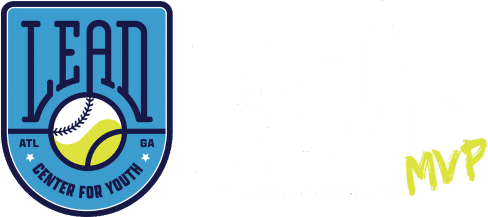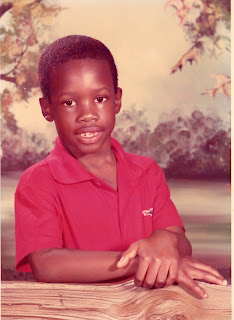Our past helps to shape who we have become as well as impact who we may become. Our past is made up of personal experiences that we can turn into stories worth sharing.
Today I turn 41. I’ve enjoyed a blessed life filled with events, experiences and decisions that have shaped me. I want to share them with you so that you can come to know me better. This post lists 41 life events, experiences and decisions that have shaped my life.
If you have not taken the time to reflect on your life experiences, events and decisions that create your personal stories, I recommend that you do. I also recommend that you write your stories down. Commit them to paper and share them so others may learn a little more about you and themselves.
Finally, one thing I’ve confirmed about myself as I carried out this exercise it that I love people. Even though sometimes, I might not act like it, I love all people. I just do. Every day the first thing I do when I
| Joseph McCrary by my side with LEAD Ambassadors |
wake up is pray. I pray for my family, of course, but I also pray for you and others. Those I’ve met and those I have not. I believe in the power of prayer and ask that as you send up prayers every day, please pray for me as well.
I hope you learn something significant from reading the following. I look forward to hearing your story someday.
- Day One: I was born to Willie and Gail Stewart on April 10, 1976 at Grady Memorial Hospital.
- Family: I become a big brotherI became a big brother to Nicole Stewart on February 16, 1979 and again to Erica Stewart on January 16, 1991.
- Faith: When I was eight or so, Reverend James E. Hightower baptized me at Elizabeth Baptist Church (EBC); in my 30s I became a Deacon at First Rephidim Missionary Baptist Church; and, starting in January, 2016 I became, and now serve as, a Deacon EBC.
- Elementary School: I was educated within Atlanta Public Schools – kindergarten through fifth grade and, in first grade, exposed to Herndon Home and, in second grade, flew on an airplane round trip.
- First Fight: During Grove Park summer camp around 8 years of age.
- Middle and High School: I was educated within Fulton County schools – 6th through 12th grade and, during my junior year at Westlake High School, visited Chick-fil-A headquarters as part of the curriculum.
- Attended First Minor League Baseball Game: At 11, I visited Boardwalk and Baseball theme park in Haines City, Florida, and attended my first minor league baseball game as a spectator.
- Youth Baseball: I played youth baseball at Cascade Youth Organization (CYO) and Old National Athletic Association (ONAA).
- Childhood Friends: Antwon Smith, Jeff Coleman, Eric Hayes family and Patrick Miller were childhood friends that inspired and encouraged me like no other.
- Acting Out in High School: I was removed from Westlake High School team because of a bad attitude, got into a fight, and in 10th grade was arrested at Shannon Mall on MLK Day.
- Professional Baseball: In 1994, my senior year of high school, I was drafted by the Chicago Cubs, and then in 1996, I was drafted again while attending DeKalb College, and released by Cubs within two years of being signed.
- College: I failed out of Georgia State University in 1995, Dekalb College in 1996, and later, in 2003, attended Kennesaw State University where I maintained a B average.
- Hank Aaron and Jury Duty: I served as a juror with Hank Aaron my rookie year of professional baseball.
- Wedding Day: At 21, I married Kelli who was 19.
- Marriage – The Early Years: Kelli and I moved into our first apartment and, during the off-season of professional baseball, I worked at ASIG fueling airplanes at Hartsfield-Jackson International Airport.
- New Business after the Cubs: In 1998, I became a professional baseball hitting coach at Sports-A-Rama in Marietta, but quit after our first daughter, Mackenzi was born in May 2001 to start our family for profit Diamond Directors.
- Daughters and Significant Early Milestones: When I became a father, in May 2001, at the birth of my daughter Mackenzi, and then again in June 2007 at the birth of my second daughter Mackenna, their first days of kindergarten, and the day they gave their life to Christ.
- Special Thanksgiving Day Event: Thanksgiving dinner with Ken Griffey Jr. and his family
- Scouting for the Reds: I became a Cincinnati Reds Scout in 2000.
- Coaching East Cobb Baseball: I coached within the internationally renowned East Cobb Baseball program 2000-2006.
- An Ah Ha Moment: In 2005, I attended the First Annual Birdies and Baseball benefiting Children’s Healthcare, and spent several days with Atlanta’s influential men to discover that I was considered an up and coming leader in Atlanta. I learned that I was there because of the leadership and service I had demonstrated up to that point and future leadership potential.
- First House and Community: Kelli and I purchased our first house and two years later I saved a young boy in the neighborhood from a pitbull attack.
- Pro-Football on a Dare: I trained for a year to try out for the Falcons and Georgia Force after a dare from Kelli.
- L.E.A.D. and McCrary: In 2007, our non-profit organization L.E.A.D. (Launch, Expose, Advise, Direct) was born; and a few years later, one of our first L.E.A.D Ambassadors, Joseph McCrary, graduated with honors from Savannah State University, became employed by our L.E.A.D. partner Mizuno and now serves on L.E.A.D.’s Executive Board.
- Diamond Directors Expands: In 2007, we establish Diamond Directors Sports Management Group and represent several Top Round MLB Draft picks that later played in the Major Leagues.
- Milestone for Diamond Directors’ Client Heyward: In 2010, I witnessed Diamond Directors’ training client Jason Heyward hit his MLB Opening Day, and first career, homerun on his first MLB at-bat.
- C.J. Stewart Day in the ATL: Atlanta City Councilman Michael Julian Bond proclaimed November 20, 2010 C.J. Stewart Day.
- Rotary Membership: I accepted Khaatim S. El’s invitation to join Rotary, and became a Rotary member.
- Snowmageddon and Discovering a New Passion: I was stuck on Atlanta’s highways with my daughter Mackenzi during Snowmageddon 2014, downloaded the Audible app and discovered a new passion for game changing books, such as Building Atlanta by Herman Russell, Mental Game of Baseball and Talent Code.
- Media Events: I was featured in a Georgia’s Own Credit Union commercial, a Mizuno Baseball commercial, an Apple commercial with four L.E.A.D. Ambassadors (2.25 mark), debuted on Chrisley Knows Best and appeared in Tanner Tees video with Devon Shaw announcing its partnership with L.E.A.D.
- Significant Outing Experiences: I experienced life in the mountains of Montana for several days with American Explorers, as well as insomnia at a 7-day USA Baseball event after just learning about what was thought to be a bad health report.
- Leadercast Event: I attended my first Leadercast event in 2013.
- Kelli and Significant Milestone: My wife, Kelli, became such an inspiration to me as I witnessed first-hand the grit required of her reach her goal to graduate with honors from Kennesaw State University.
- Financial Education: John White became our family’s financial advisor and introduced me to my discipleship partner Mike Moye.
- Life-Changing Kingdom Man: In 2013, I joined a life-changing church-wide study called Kingdom Man by Tony Evans, and now enjoy The Locker Room at Elizabeth Baptist Church.
- Benediction for Donald Green Inauguration: Donald Green, President of Georgia Highlands College, blessed me with the opportunity to give the benediction at his inauguration.
- Leadership Atlanta: In 2015, I completed my Leadership Atlanta cohort education where I became empowered to serve as a change agent in Atlanta.
- My Dad’s Bypass Surgery: My dad had successful quadruple bypass surgery and his experience caused me to change my diet and exercise regimen.
- My Content Crew: I am blessed to have a great relationship with my “Content Crew” consisting of Mike Pallerino, Goebel Media, Rose Caplan, Brigitte Peck,
and Dez Thornton…they help me bring my thoughts to you.
- My First Book: I was challenged by Gabriel Wallace to write a book Living To L.E.A.D. A Story of Passion, Purpose and Grit and took her up on it.
- “Meeting” My Mom’s Dad: I never had a chance to meet my grandfather, Elester Moss, Sr. However, just recently, on April 5, 2017, while my mom was recovering from surgery, I saw a photo of him for the first time, and discovered how I resemble him.



